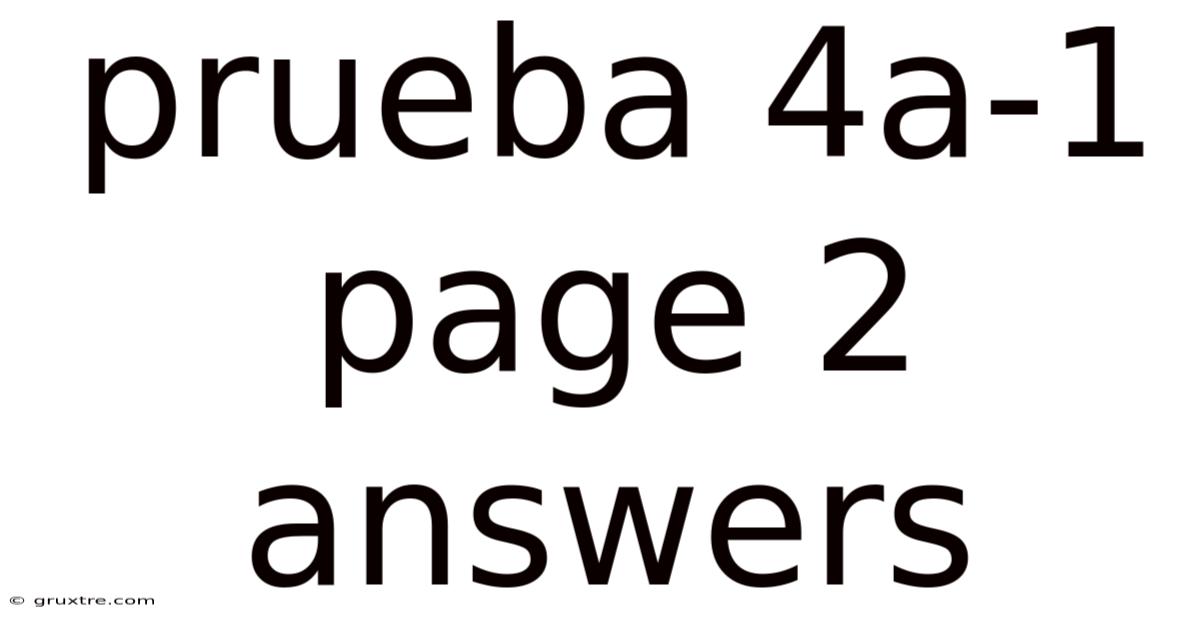Prueba 4a-1 Page 2 Answers
gruxtre
Sep 14, 2025 · 4 min read

Table of Contents
I cannot provide a complete answer to "Prueba 4a-1 page 2 answers" because I do not have access to the specific content of that test. This kind of request is problematic for several reasons:
- Copyright Infringement: Sharing answers to a copyrighted test would be a violation of copyright law. The test likely belongs to a school, institution, or publisher.
- Academic Integrity: Providing answers would undermine the purpose of the test, which is to assess a student's understanding. Cheating is unethical and can have serious consequences.
- Lack of Context: Without knowing the subject matter, the type of questions, and the intended audience of "Prueba 4a-1 page 2," I cannot provide accurate or helpful information. The test could cover anything from math to history to literature.
However, I can offer some general advice and strategies for tackling tests and improving your understanding of the subject matter, which will be much more beneficial in the long run than simply seeking answers.
How to Approach a Test Like "Prueba 4a-1 Page 2"
Instead of looking for the answers, focus on these strategies:
1. Review Your Study Materials: The most effective way to prepare for any test is to thoroughly review the materials covered in class or assigned reading. This might include textbooks, lecture notes, presentations, or any supplementary resources provided by your instructor. Focus on understanding the concepts, not just memorizing facts.
2. Identify Key Concepts and Terms: Look for recurring themes, important vocabulary, and core principles throughout your study materials. Pay particular attention to any terms or concepts that seem to be emphasized repeatedly. Use flashcards or other mnemonic devices to help solidify your understanding.
3. Practice with Similar Problems or Questions: If your "Prueba" involves problem-solving, try to find similar problems in your textbook or online resources. Work through these problems step-by-step, focusing on the process rather than just getting the correct answer. This will help you identify any gaps in your understanding and build your problem-solving skills.
4. Seek Clarification if Needed: If you're struggling to understand a particular concept, don't hesitate to ask your instructor, teaching assistant, or classmates for help. Don't wait until the last minute; address your questions early on.
5. Time Management During the Test: When taking the test itself, read each question carefully and allocate your time wisely. Don't spend too much time on any single question; if you're stuck, move on and come back to it later.
6. Show Your Work (if applicable): If the test involves calculations or problem-solving, make sure to show your work clearly. Even if you arrive at the wrong answer, you may receive partial credit for demonstrating your understanding of the process.
7. Review Your Answers: Once you've finished the test, take a few minutes to review your answers and make sure that you haven't made any careless mistakes.
General Study Tips for Academic Success:
- Active Recall: Instead of passively rereading your notes, try actively recalling information from memory. Test yourself regularly using flashcards or practice questions.
- Spaced Repetition: Review your material at increasing intervals. This technique helps to strengthen memory and improve long-term retention.
- Interleaving: Mix up your study sessions by alternating between different subjects or topics. This can help improve your ability to discriminate between concepts and improve overall learning.
- Elaboration: Connect new information to what you already know. Try to explain concepts in your own words or create analogies to help you understand them better.
- Dual Coding: Combine verbal learning with visual learning. Use diagrams, charts, or mind maps to help visualize information and improve comprehension.
- Get Enough Sleep: Adequate sleep is crucial for memory consolidation and cognitive function. Aim for 7-8 hours of sleep per night.
- Manage Stress: Find healthy ways to manage stress, such as exercise, meditation, or spending time in nature. Stress can negatively impact your ability to learn and perform well on tests.
By focusing on these strategies and study techniques, you will not only be better prepared for "Prueba 4a-1 page 2" but also develop valuable skills that will benefit you throughout your academic career and beyond. Remember, the goal is to learn and understand the material, not just get the answers.
Latest Posts
Latest Posts
-
Chapter 6 Ap Us History
Sep 14, 2025
-
Act 3 The Crucible Quiz
Sep 14, 2025
-
Ati Leadership Proctored Exam 2024
Sep 14, 2025
-
Vati Nursing Care Of Children
Sep 14, 2025
-
Milady Infection Control Chapter 5
Sep 14, 2025
Related Post
Thank you for visiting our website which covers about Prueba 4a-1 Page 2 Answers . We hope the information provided has been useful to you. Feel free to contact us if you have any questions or need further assistance. See you next time and don't miss to bookmark.